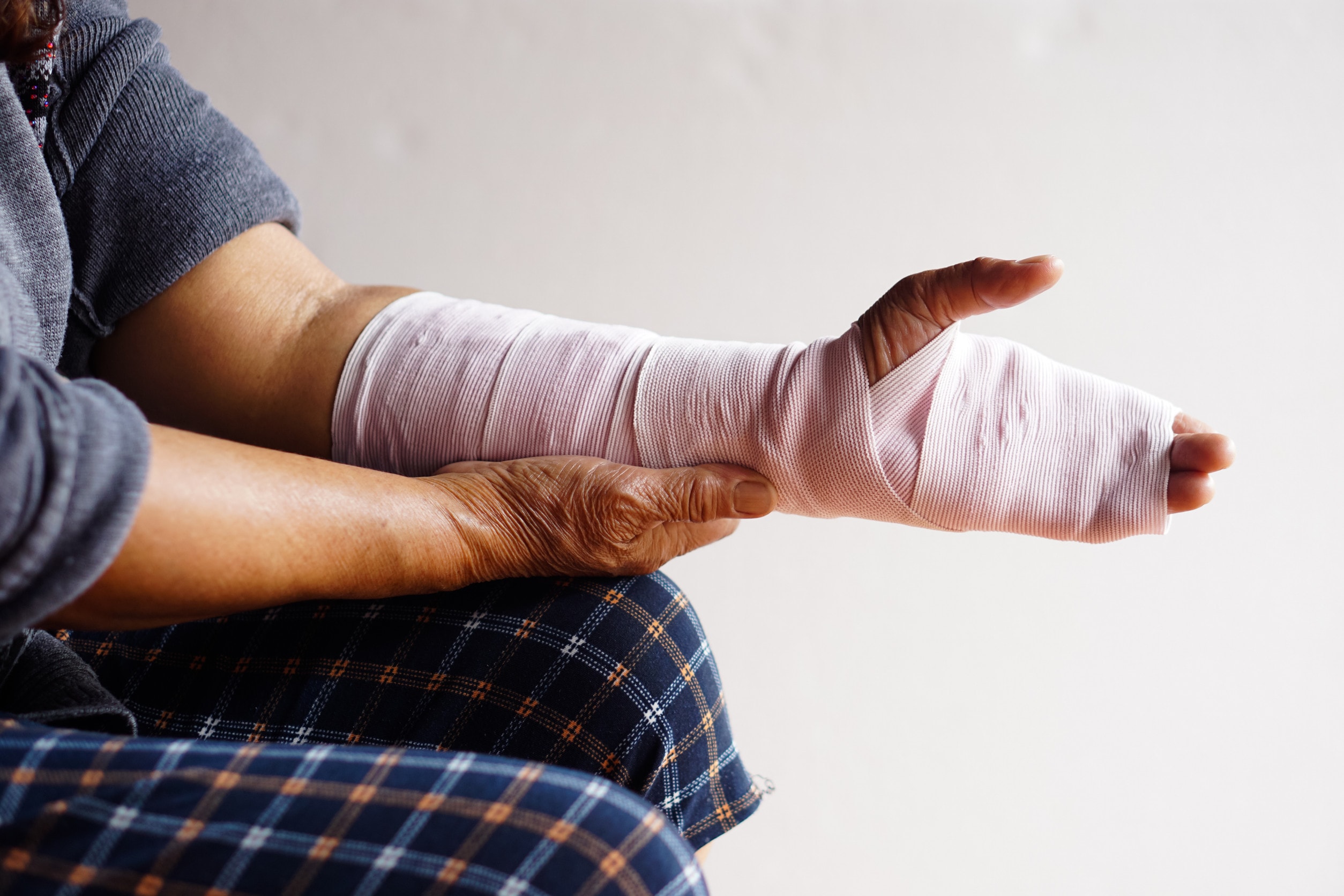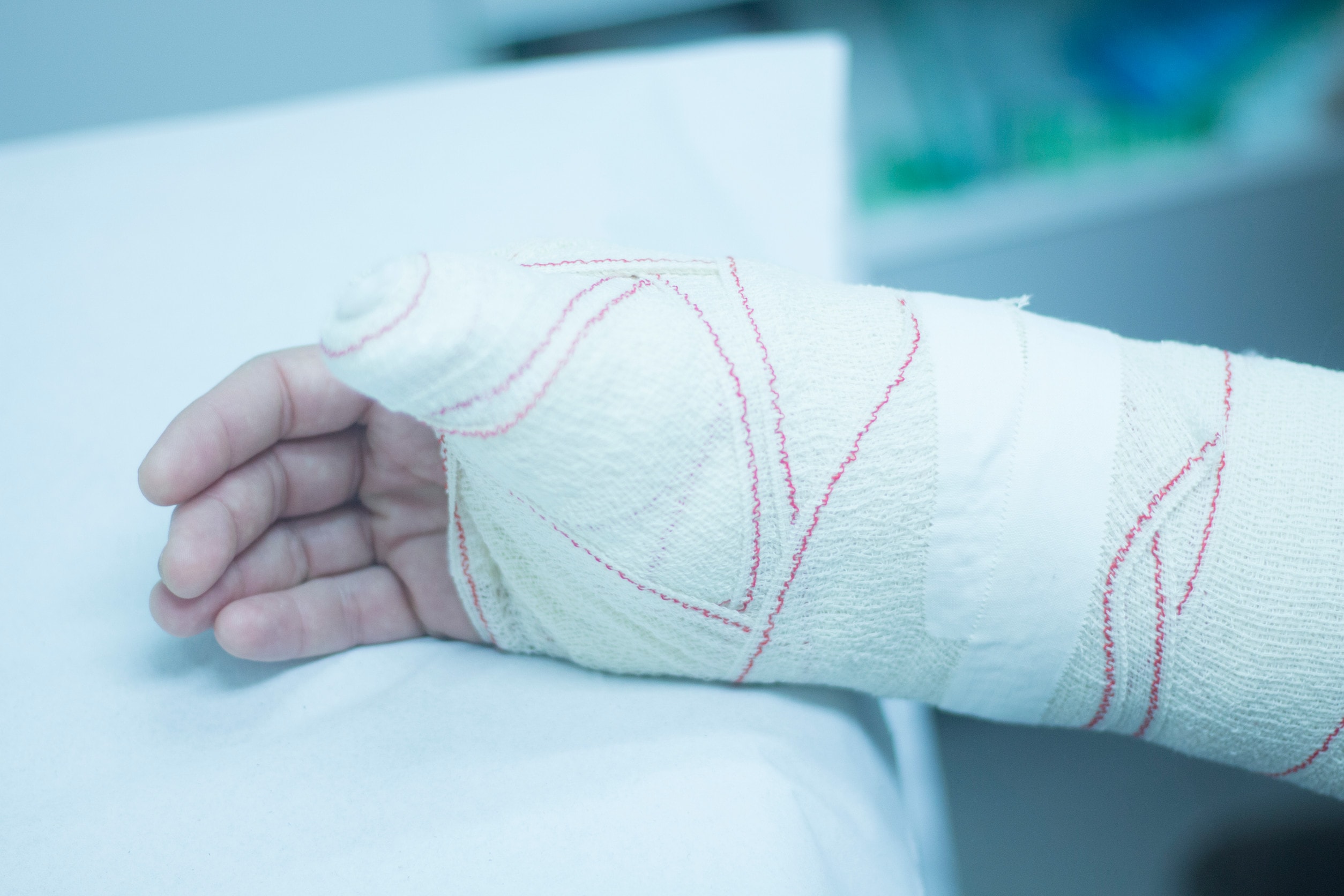Are you wondering how to sue for broken bone compensation? Bone fractures can be incredibly painful and may have serious consequences on your daily life, work, and long-term health. This comprehensive guide explains the steps involved in making a claim and how one of the solicitors from our panel of solicitors can help.
Our guide will outline the eligibility criteria for starting a broken bone compensation claim, whether there are any deadlines for claiming, and what evidence might support your case. From road traffic accidents and workplace injuries to slips, trips, and falls in public places and medical negligence, this guide will also provide detailed insight into the most common causes of broken or fractured bones and why they might be grounds to claim compensation.
What You Need To Know
- You may be able to claim compensation for a fractured or broken bone if someone responsible for your safety is at fault.
- If your claim is successful, you may be compensated for your injuries and related financial losses.
- Common causes of broken bone claims include accidents on the roads, at work, and in public spaces.
- Typically, there is a 3-year time limit for starting a claim, but there are exceptions to this.
- You may be able to make a claim through one of the No Win No Fee solicitors from our panel.
Contact Us
Our advisors are here to help. Whether you’re ready to get started or would like further guidance, get in touch today by:
- Calling us on 0800 408 7827
- Using the live chat feature
- Contacting us online
Jump To A Section
- How To Sue For Broken Bone Compensation
- The Common Accidents In Broken Bone Claims
- What Compensation Could Be Paid Out For A Broken Bone?
- Is There A Broken Bone Claim Time Limit?
- Do I Need Evidence To Support My Claim?
- Can I Make A No Win No Fee Broken Bone Claim?
- More Information
How To Sue For Broken Bone Compensation
To be eligible to claim broken bone compensation, you must be able to prove that:
- A duty of care was owed to you by another individual or an organisation. We’ll talk more about duty of care in the next section.
- That duty was breached, either through action or inaction.
- You suffered harm, such as a fractured or broken bone, as a direct result.
These criteria form the foundation of any personal injury compensation claim because when all 3 factors come together, it forms negligence. As long as you satisfy the criteria, then you may be able to make a personal injury claim.
Keep reading for more information on when you could be owed a duty of care, or contact our advisory team today to learn more about how to sue for broken bone compensation.
The Common Accidents In Broken Bone Claims
Below, you can find some of the more common accidents seen in broken bone claims.
Road Traffic Accidents
Every road user, including drivers, cyclists, and pedestrians, has a duty of care to avoid causing injury or damage to one another (including to themselves). To help uphold this duty, they must follow the Road Traffic Act 1988 and the Highway Code.
Drivers, for example, must obey speed limits, avoid using mobile phones while driving, give way appropriately, and drive according to road and weather conditions. If a road user fails to fulfil their duty of care, resulting in someone suffering injuries, there may be grounds to claim compensation.
- You break your wrist in a rear-end collision with a driver who is going over the speed limit. Their speeding means they are unable to stop in time, while you go on to develop osteoarthritis as a result of the injury.
Accidents At Work
Employers must comply with the Health and Safety at Work etc. Act 1974. This legislation requires employers to take all reasonably practicable steps to ensure the health, safety, and welfare of their staff. For instance, employers can conduct regular risk assessments, supply suitable personal protective equipment (PPE), and offer proper training.
- Office management fails to regularly inspect the workplace for potential hazards. Subsequently, you trip on a trailing wire, causing you to fall heavily and break your arm.
Public Place Accidents
Occupiers, such as local authorities and businesses, have a duty of care to ensure that visitors are reasonably safe in public places. This duty is established under the Occupiers’ Liability Act 1957 and applies to various locations, including theme parks, shops, restaurants, and public buildings.
To meet this duty, occupiers can carry out regular inspections, display warning signs where appropriate, and ensure facilities or equipment are adequately maintained. If an occupier fails to take such measures, it may lead to scenarios like the following:
- Supermarket staff fail to place ‘wet floor’ signs while cleaning the store and leave the slippery surfaces unattended. Due to this failure, you slip and fall while walking through an aisle, resulting in you breaking your ankle.
Medical Negligence
Medical professionals, including doctors and nurses, are expected to provide patients with the correct standard of care. This duty of care covers both the private and public sectors and extends to medical settings like hospitals and GP practices.
If you suffer unnecessary or avoidable harm because of substandard care, then you may have a case for compensation. Medical negligence claims can include delayed treatments or surgeries, misdiagnoses, and failures to make referrals where appropriate.
- Your doctor misinterprets the scans of an X-ray, meaning they miss the signs of a fracture. This delays a correct diagnosis, resulting in you developing an infection and causing the fracture to not fully heal.
Criminal Injuries
If you sustained a broken bone or fracture as a result of a violent crime, you may be entitled to claim compensation through the Criminal Injuries Compensation Authority (CICA). This government-funded scheme compensates victims of crimes like assault, including those with multiple fractures or broken bones.
To be eligible, the incident must have been reported to the police, and the application usually needs to be made within 2 years of the crime.
Our advisors are here to help. If you’d like to learn more about making a criminal injury claim or if you’re looking for more information on how to sue for broken bone compensation, contact us today.
What Compensation Could Be Paid Out For A Broken Bone?
Your broken bone compensation may be divided into 2 parts:
- General damages: For the pain, suffering, and loss of amenity resulting from your injuries. A loss of amenity concerns how your quality of life and ability to do day-to-day tasks has been affected, such as playing sports.
- Special damages: For financial losses arising from your injuries.
Solicitors may assess your general damages through medical evidence and the Judicial College Guidelines (JCG) document. This publication lists suggested compensation brackets for many injuries, including broken bones.
You can see some examples of these brackets in the table below. Please keep in mind that the table isn’t a guarantee of compensation, and the first entry is not from the JCG.
| Injury | Compensation |
|---|---|
| Multiple severe injuries and special damages, which might include financial losses such as lost earnings or the cost of a mobility aid | Up to £350,000+ |
| Severe (i) neck injuries | In the region of £181,020 |
| Severe back injuries (i) | £111,150 to £196,450 |
| Severe pelvis/hip injuries (i) | £95,680 to £159,770 |
| Severe fractures to fingers | Up to £44,840 |
| Less serious (i) leg fractures from which an incomplete recovery is made or serious soft tissue injuries | £21,920 to £33,880 |
| Less serious (ii) simple femur fracture (and no articular surface damage) | £11,120 to £17,180 |
| Less serious (iii) simple tibia/fibula fracture/soft tissue injuries | Up to £14,450 |
| Simple fractures of the forearm | £8,060 to £23,430 |
| Wrist injuries (d) | £7,420 to £12,630 |
Can I Claim For Financial Losses Incurred Due To The Break?
You can claim for any financial losses incurred due to a broken or fractured bone injury. These may include:
- Loss of earnings, including missed shifts or lost overtime
- Medical expenses like prescriptions and private treatments
- Travel costs related to attending hospital or other medical appointments
- Care from professionals or family
- Mobility aids like crutches or wheelchairs
You need to be able to prove these losses to claim them back, so it can be helpful to keep all relevant documents, such as receipts, payslips, and invoices. Keep reading to learn more about how to sue for broken bone compensation, or get in touch today to get started.
Is There A Broken Bone Claim Time Limit?
Yes, there is a 3-year time limit for filing a broken bone claim, starting from the date of the incident. However, per the Limitation Act 1980, there are exceptions for certain groups who cannot make a claim by themselves:
- Children under 18: The time limit is paused until a person’s 18th birthday. A litigation friend, such as a parent or solicitor, can claim on a child’s behalf during this pause. If that doesn’t happen, then they’ll have until their 21st birthday to start their own claim.
- People lacking mental capacity: The time limit is paused indefinitely unless capacity is regained. If capacity is regained, then the 3 years start to run down from when the recovery occurred. As with children, a litigation friend can claim on their behalf at any time while time limits are on hold.
How Long Will It Take For My Compensation Claim To Be Settled?
There is no fixed timeframe for how long it will take for your compensation claim to be settled. The time it takes may depend on:
- If you’re still receiving treatment for your injuries
- What evidence is needed to support your claim
- Whether the other party admits liability and if there are disagreements during negotiations
If you’re wondering whether or not you are within the time limit to make a broken bone claim, contact our team of advisors today. Or, keep reading for more information on how to sue for broken bone compensation.
Do I Need Evidence To Support My Claim?
Yes, you will need evidence to support your broken bone claim and show how you were injured because of someone else’s negligence. This evidence could include:
- Medical records that show how severe your injuries are and what treatment you received
- Accident scene photos that might show how the incident happened
- CCTV or dashcam footage showing the accident in which you suffered broken bones
- Witness contact details so that their statements can be taken later by a solicitor. Our panel of solicitors have extensive experience gathering all kinds of evidence for their clients, including statements
- Accident book entries (for workplace incidents or accidents in public places)
- Driver details if your broken bones were the result of a road traffic accident. This information should include their insurance and details about the vehicle, including its model, registration, and make
Will I Need To Attend A Medical Appointment To Prove My Injury?
You may be asked to attend an independent medical assessment to prove your broken bone injury. A medical professional will:
- Examine your injury
- Review your medical records
- Provide a detailed report on the severity of your broken bones and other injuries, as well as the recovery outlook
If you choose to work with a solicitor from our panel, they can arrange this appointment for you and make sure that it’s local and convenient for you.
Will My Broken Bone Claim Go To Court?
It’s unlikely that your broken bone claim will need to go to court. Most cases settle outside of court with a payout negotiated between the involved parties. Typically, claims will go to court in situations if those negotiations fail, or if a defendant refuses to admit to their liability.
In the rare event your claim goes to court, a solicitor from our expert panel will be there to support you and make whatever preparations are needed. You can contact our advisory team to find out more about their work and the claims process in general.
Keep reading to find out how to sue for broken bone compensation with a solicitor from our panel.
Can I Make A No Win No Fee Broken Bone Claim?
At How To Sue, our priority is making sure that your claim has the best possible chance of success. Our panel of solicitors have years of experience and knowledge in all areas of personal injury claims, and can give you whatever guidance you need on how to sue for broken bone compensation.
If you choose to claim with a solicitor from our panel, they can help you every step of the way, from gathering evidence to negotiating compensation. They offer their work under a type of No Win No Fee arrangement known as Conditional Fee Agreement (CFAs). This means:
- You pay no solicitor fees upfront
- You don’t pay any solicitor fees while your claim is ongoing
- If your claim doesn’t succeed, then you won’t pay a solicitor fee for the work done on the claim
You only pay a success fee if your claim wins. This fee is payment for the solicitor’s work and is deducted from your compensation. However, you keep the majority of what you receive as the percentage deducted is capped. If your claim doesn’t succeed, then you won’t pay any solicitor fees.
Contact How To Sue’s Advisors
Our advisors are here to help and do everything they can to help you find out whether you are eligible to make a claim. To get started on your broken bone compensation claim, contact us today by:
- Calling us on 0800 408 7827
- Using the live chat feature
- Contacting us online
More Information
For more helpful personal injury guides:
- Find out how to sue for a warehouse accident
- Learn how to make a factory accident compensation claim
- Get information on claiming for a broken arm at work
Or, to learn more:
- Learn about broken bones from the NHS
- Find out how to request CCTV footage of yourself
- Get help with Statutory Sick Pay (SSP)
Thank you for reading our guide on how to sue for broken bone compensation.




